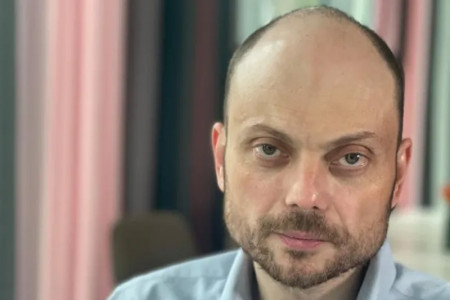It’s almost the first thing Vladimir Kara-Murza tells me after his surprise release in the biggest prisoner exchange since the Cold War.
The Russian opposition politician is painfully thin – from stress, he says. He’s also still reeling from his abrupt transfer from a high security jail in Siberia into forced exile, after more than two years behind bars.
“It’s surreal, like I’m watching a film,” he describes the feeling. “But it’s a good film,” in which he’s finally been reunited with the family he hasn’t seen since his arrest in Moscow in April 2022.
His youngest son has been following him everywhere, anxious not to let him out of his sight.
Vladimir Kara-Murza, who is also a British citizen, was convicted of treason and sentenced to 25 years for his fierce and persistent condemnation of Vladimir Putin and the full-scale invasion of Ukraine.
He has spent the past 11 months straight in solitary confinement, made to fold away his bed each morning at 05:00 and only given paper and pen for an hour or so each day.
“It’s so easy to lose your mind. You lose sense of time, space. Everything really,” he reveals, in one of his first long interviews since release. “You do nothing, speak to no one, go nowhere. Day after day after day.”
He was denied phone calls home, only allowed to speak to his children twice in over two years.
The added punishment was even tougher, physically.
Almost a decade ago, Vladimir Kara-Murza nearly died from an unknown toxin and still suffers from after-effects, including nerve damage. In September, he now reveals, a prison doctor gave him "a year, 18 months at best" to live, if he stayed behind bars.
“After two FSB poisonings, I don’t exactly have the right state of health for a strict regime prison,” he explains, with a wry smile.
Last week, Kara-Murza was one of eight Russian dissidents who went missing from their prisons.
As lawyers and relatives sounded the alarm, rumours of a looming swap began to swirl. The prisoners themselves had no idea.
Instead, when guards burst into Kara-Murza’s cell in Omsk he thought he would be “led out to be shot”, he recalls. “I actually thought they were going to execute me.”
He’d recently been instructed to sign a request for a presidential pardon but refused to beg for mercy from Vladimir Putin, who he denounces as “a dictator, usurper and a murderer”.
Kara-Murza was transferred to Moscow and the notorious Lefortovo FSB jail. Five days later he was led out to board a bus and saw the other dissidents inside, each one with an FSB guard in a balaclava.
Another guard then took the bus microphone and announced they were being taken for a prisoner swap, no details.
“No-one asked our consent,” Kara-Murza says. “We were loaded onto a plane like cattle and flown out.”
The activist landed in Germany in the only civilian clothes he owned: black long-johns and T-shirt, and the flip flops he used for the prison shower.
The Russian dissidents were part of a "bundle" of political prisoners released, along with high-profile US nationals like the journalist Evan Gershkovich.
Three were former activists from the team of Alexei Navalny, the opposition politician who died suddenly in prison earlier this year. Originally, Navalny was to be part of the complex swap.
In return for the dissidents, Russia got a handful of spies and criminals including the key prize sought by Vladimir Putin: an FSB hitman known as Vadim Krasikov who’d murdered in broad daylight in a Berlin park.
The judge sentencing him to life in prison had called the killing an act of "state terrorism".
“To everyone who criticises this [swap], I would respectfully urge them not to think of prisoner exchanges but of saving lives,” Kara-Murza argues, in response to the controversy over freeing Krasikov.
The killer was welcomed home to a red carpet and a hug from Putin himself.
“Aren’t 16 lives worth releasing one murderer?”
For a long time, Germany wasn’t sure. The delay, Kara-Murza argues, may be what cost Alexei Navalny his life.
Sarah Rainsford


